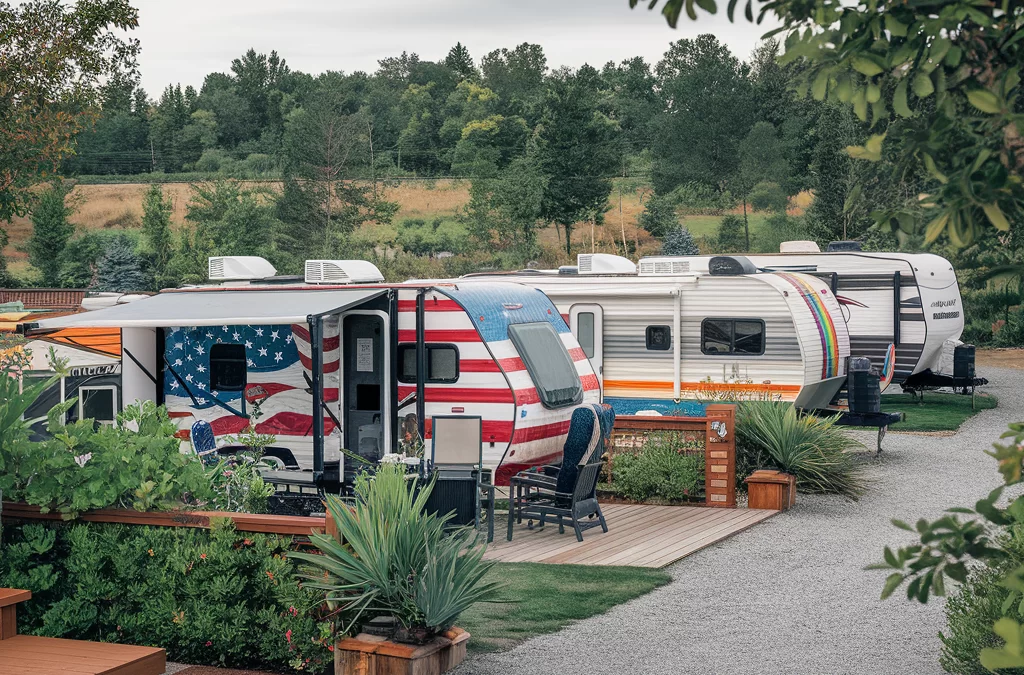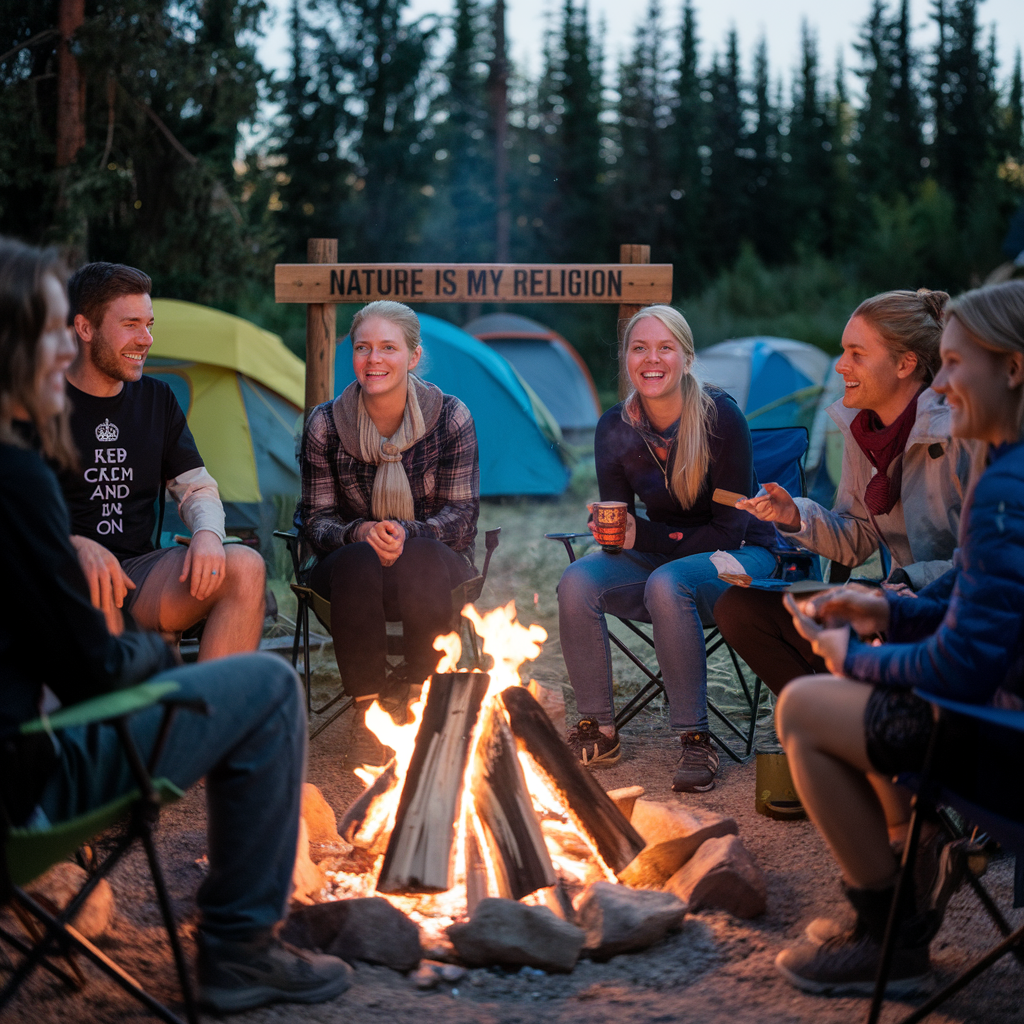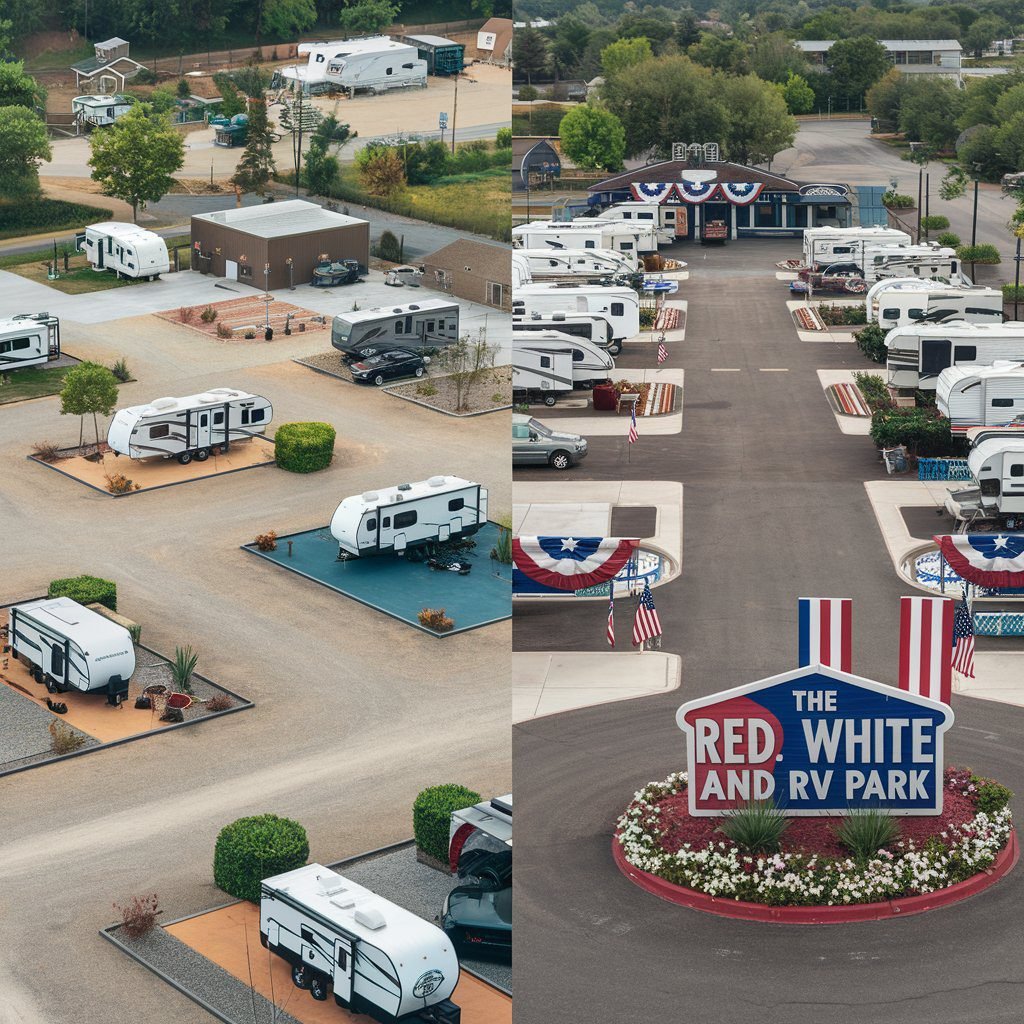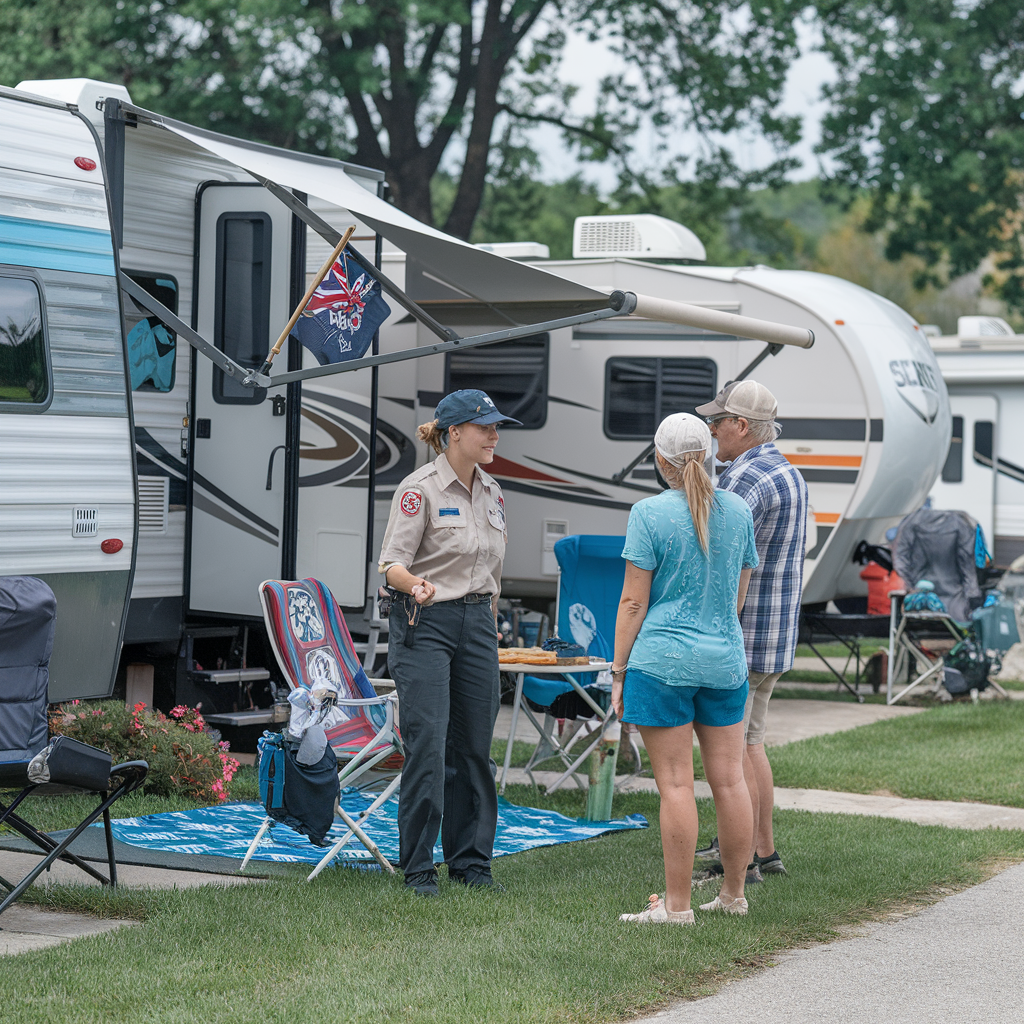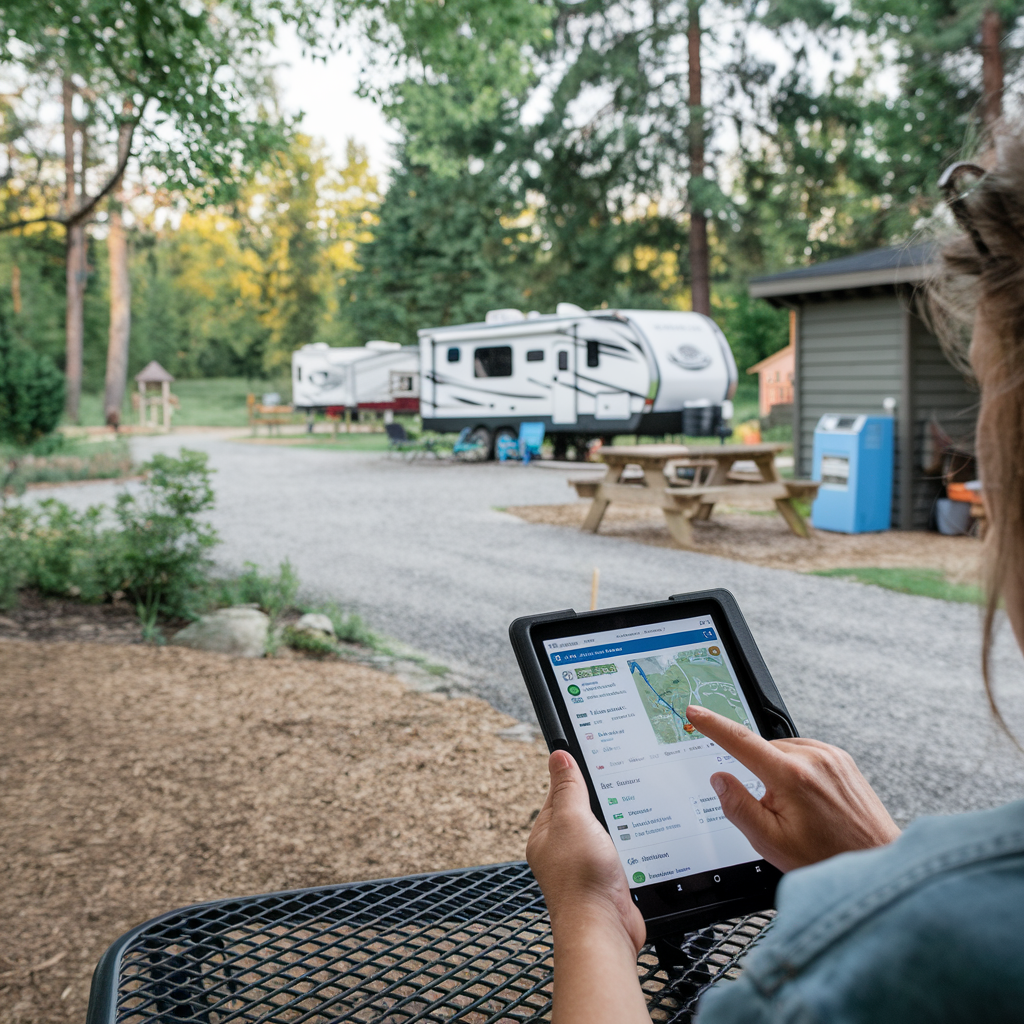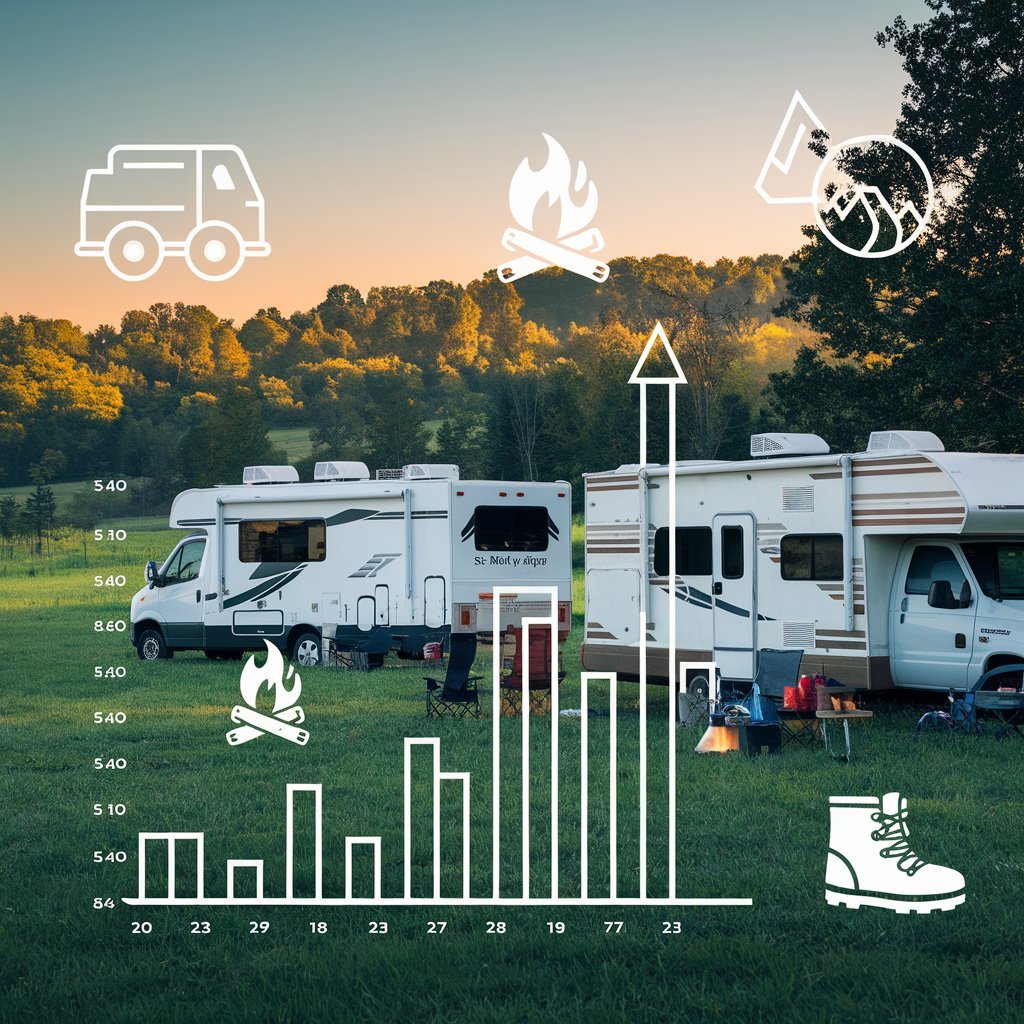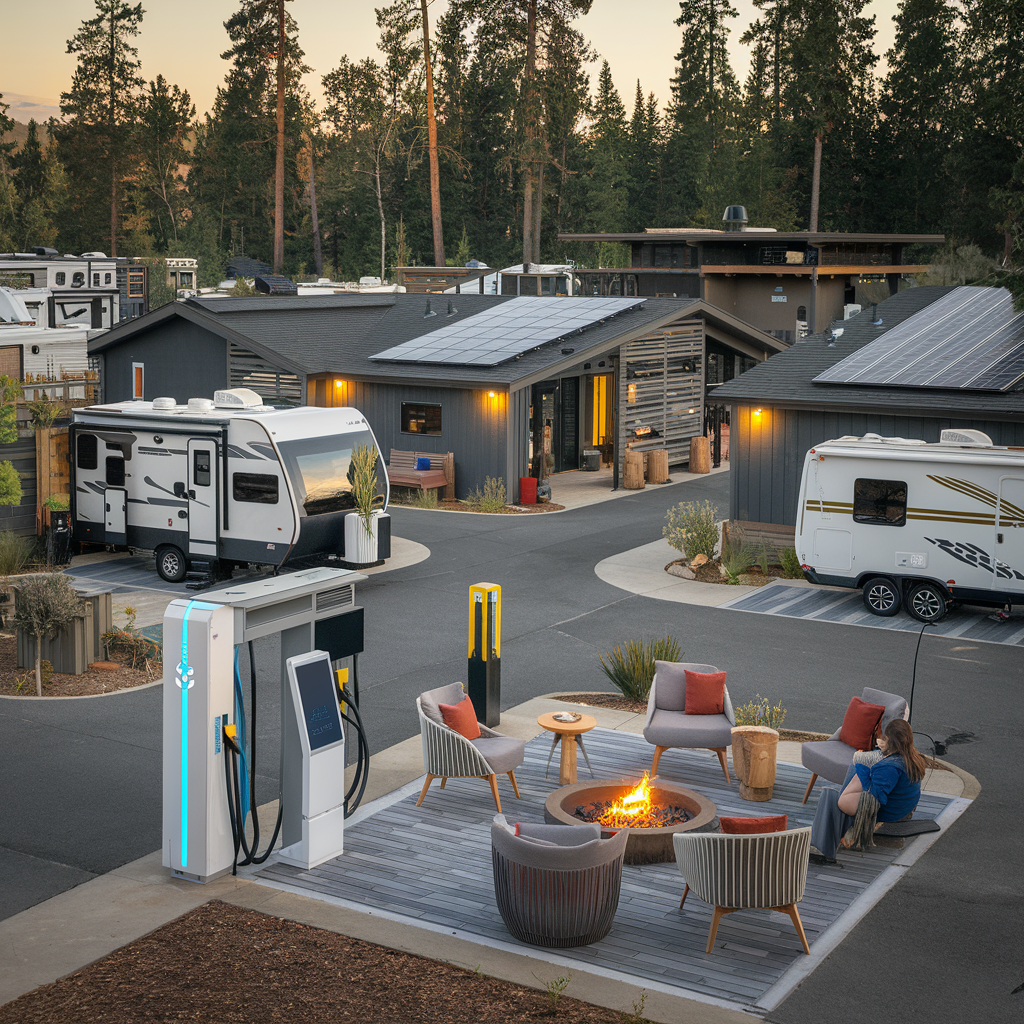The American RV lifestyle has long represented freedom, adventure, and the ability to forge your own path. Yet a fascinating new trend is emerging across the nation’s campgrounds and RV parks: the rise of politically-themed camping experiences. This shift reflects broader cultural changes in American society, where even our leisure activities increasingly align with our personal values and political identities.
According to the RV Industry Association (RVIA), RV ownership has surged by 62% over the past five years, with over 11.2 million households now owning an RV. This dramatic increase has sparked innovation in how RV parks cater to their diverse clientele, giving rise to what industry experts call “affinity camping” – destinations designed specifically for like-minded individuals who share similar values, interests, or political beliefs.
The emergence of politically-themed RV parks, exemplified by the MAGA RV Park in Quartzsite, Arizona, represents perhaps the most striking example of this trend. This development has sparked conversations about the future of camping culture and whether the traditional “come one, come all” approach to outdoor hospitality is evolving into something more segmented and specialized.
Understanding the Trend: Expert Perspectives
Industry analysts and RV park operators are closely monitoring this evolution in camping culture. Kampgrounds of America (KOA), which operates the largest network of private campgrounds in North America, reports in their 2023 North American Camping Report that campers are increasingly seeking experiences that align with their personal values and lifestyle choices.
“What we’re seeing isn’t just about political alignment,” explains Sarah Martinez, a veteran RV park consultant with 20 years of experience. “It’s part of a broader shift toward community-based camping experiences where people can feel completely at ease with those around them.”
Impact on the Industry and Camper Experience
The emergence of politically-themed RV parks has created both opportunities and challenges for the industry. Park owners report varying financial impacts:
- Niche Market Success: Some politically-aligned parks report occupancy rates 15-20% higher than traditional parks during peak seasons. According to the RV Industry Association (RVIA), these niche markets continue to attract specific audiences willing to pay a premium.
- Traditional Park Adaptation: Many established RV parks are actively maintaining political neutrality to preserve their broad appeal. This approach is highlighted in the 2023 North American Camping Report by Kampgrounds of America, which indicates a shift toward neutrality among traditional campgrounds to meet the needs of diverse campers.
- Revenue Considerations: While themed parks can command premium prices from their target audience, they may limit their overall market potential. Research from USA.gov suggests that revenue growth in politically-themed parks may be constrained due to limited appeal across a broad audience base.
Safety and Comfort Considerations
The trend toward affinity camping has raised important considerations about camper safety and comfort. Traditional RV parks typically maintain strict policies about political displays and discussions to prevent conflicts among guests. However, themed parks take a different approach, creating environments where like-minded individuals can freely express their views.
The Quartzsite case study offers interesting insights. Local tourism data indicates that while the MAGA RV Park has attracted a dedicated following, it has also inspired other parks in the area to more clearly define their own positioning – whether political or deliberately neutral. This has created a more diverse range of options for RVers, allowing them to choose environments that best match their comfort levels.
What RVers Are Looking For
The rise of politically-themed camping has sparked numerous discussions across RV forums and social media platforms. Common questions and concerns from the RV community include:
Primary Considerations
- Location and Proximity to Attractions: RVers often seek out parks that are near popular landmarks and destinations. Resources like National Park Service sites provide insights into nearby natural attractions.
- Park Amenities and Facilities: Important for longer stays, amenities like clean bathrooms, laundry facilities, and recreational spaces are highly valued by travelers. KOA’s campground amenities guide lists typical features available across their locations.
- Community Atmosphere and Social Environment: Many RVers prioritize parks with a positive social environment that aligns with their lifestyle and values.
- Political Alignment or Neutrality Policies: For some, the political stance or neutrality of the park plays a key role in the decision-making process, as noted by discussions on sites like iRV2.
- Safety and Conflict Management Approaches: Safety is always a primary concern. Many campers inquire about a park’s approach to handling potential conflicts to ensure a peaceful stay.
Real Experiences from the Road
RV enthusiasts across various online forums have shared diverse perspectives on this emerging trend. Here are some representative views from popular RV forums:
“We’ve been full-timing for 8 years and recently stayed at a politically-themed park. While the facilities were excellent, we missed the diverse conversations we usually have with fellow travelers.” – JaneD, RVLife.com forum
“Our family specifically seeks out neutral parks. Camping has always been our escape from day-to-day tensions, and we want to keep it that way.” – CampingDad2023, iRV2.com
“The themed park we visited had an incredibly strong sense of community. Everyone was on the same page, which made for really comfortable social gatherings.” – DesertExplorer, r/GoRVing
Finding Your Perfect Park
For RVers navigating this evolving landscape, several factors can help guide their decision-making:
- Personal Preference: Consider whether you view camping as an escape from or extension of your daily life and values. Resources like MentalHealth.gov offer insights on how personal values impact lifestyle choices.
- Travel Purpose: Short-term visitors might prioritize different factors than long-term or seasonal campers. For insights on planning, the National Park Service’s trip planning guide can be useful.
- Social Expectations: Think about whether you’re seeking like-minded community or diverse interactions. Kampgrounds of America (KOA) highlights social aspects of camping in their reports on campground communities.
- Family Considerations: Factor in the comfort and preferences of all family members. The Child Welfare Information Gateway offers guidance on family-friendly travel and accommodations.
- Length of Stay: Longer stays might make community alignment more important. Many parks on Recreation.gov provide options tailored for extended visits, which may be ideal for long-term campers.
The Changing Landscape of RV Park Operations
The rise of affinity camping has prompted significant operational changes across the industry. Park owners and operators are adapting their business models in various ways:
Traditional Parks Adapting
Many established RV parks are taking deliberate steps to maintain neutrality while still creating welcoming environments:
- Clear Policies: Implementing and communicating specific guidelines about political displays and discussions. Guidelines from USA.gov’s state consumer protection resources provide models for setting and enforcing policies.
- Staff Training: Enhanced training for conflict resolution and maintaining inclusive environments. Training resources from the U.S. Department of Labor cover best practices in hospitality and customer service.
- Marketing Focus: Emphasizing natural amenities and traditional camping values rather than social or political aspects. This approach aligns with findings from the National Park Service on visitor expectations for park experiences.
- Community Activities: Organizing events that bring people together around shared outdoor interests rather than political views. Many parks are inspired by Recreation.gov’s community programs that focus on nature and conservation.
Themed Parks Emerging
Politically-themed parks are developing distinct operational models:
- Targeted Marketing: Using specific channels and messaging to reach their intended audience. Many parks leverage platforms like Social Media Gov for targeted digital campaigns tailored to niche markets.
- Community Programming: Organizing events and activities that align with their community’s values, often drawing inspiration from ICMA’s community development guidelines to ensure programming that resonates deeply with visitors.
- Membership Models: Some parks are implementing membership systems or referral requirements to build a more exclusive community. The concept mirrors loyalty programs seen in National Park Foundation membership models that promote repeated engagement and community loyalty.
- Specialized Amenities: Designing facilities and services that cater to their specific demographic, inspired by trends in U.S. tourism reports that highlight the value of tailored services in driving visitor satisfaction.
Industry Data and Trends
Recent statistics from the camping industry reveal interesting patterns:
- 68% of RVers say community atmosphere influences their choice of campground, as noted in KOA’s 2023 North American Camping Report.
- 42% have changed their preferred camping locations in the past two years, a shift attributed to evolving preferences highlighted by the RV Industry Association (RVIA).
- 35% express interest in camping with like-minded individuals, an affinity trend explored by National Park Service studies on visitor demographics.
- 45% prioritize “neutral” or “politics-free” environments, a preference documented in surveys by Pew Research Center that examines Americans’ social and leisure choices.
Future Projections
Potential Growth Areas
- Regional Variations: Certain geographic areas may see higher concentrations of themed parks, especially in regions identified by the U.S. Travel Association as key growth zones for RV travel.
- Hybrid Models: Some parks may experiment with designated areas or seasonal programming for different groups. This concept mirrors hybrid lodging models promoted by ICOM in the hospitality sector.
- Technology Integration: Enhanced booking platforms that help RVers find parks matching their preferences, with digital advancements encouraged by the National Telecommunications and Information Administration.
- Community Networks: Formation of loose networks among similarly-aligned parks, a trend discussed by Urban Institute’s studies on community networks.
Challenges and Opportunities
Challenges:
- Maintaining industry-wide standards while accommodating diverse approaches, a balancing act outlined by the ASTM International in their standards for service industries.
- Balancing specialization with broad market appeal, an issue that hospitality sector experts like those from the American Hotel & Lodging Association continually address.
- Managing potential reputation impacts, a challenge explored in depth by Reputation Institute.
- Addressing insurance and liability considerations, a key concern for park operators referenced by the Insurance Information Institute.
Opportunities:
- Increased customer loyalty in specialized parks. Studies from Harvard Business Review highlight how niche offerings often build strong customer loyalty.
- Higher revenue potential through targeted services, as noted by McKinsey & Company, which emphasizes revenue growth from personalized service models.
- Enhanced community building, a concept explored in detail by Brookings Institution in their research on community-focused business strategies.
- Innovation in park programming and amenities, with guidance from U.S. Travel Association on trends in tourism that promote unique and tailored amenities.
Looking Ahead: The Future of RV Culture
The emergence of politically-themed RV parks represents more than just a business trend – it’s a reflection of broader social changes in American society. As Bob Thompson, president of the National Camping Association, notes: “The RV community has always been about freedom of choice. These new options simply give RVers more choices in how they experience the outdoor lifestyle.”
Maintaining the Spirit of RVing
Despite the growing segmentation, certain core values of RV culture remain constant:
- The desire for adventure and exploration, a long-standing principle of RV travel celebrated by RV Industry Association.
- Appreciation of natural beauty, as supported by National Park Service initiatives encouraging RVing in protected parks and scenic areas.
- The importance of community connections, emphasized by Kampgrounds of America (KOA) in their annual reports on camper preferences.
- The freedom of the open road, a core aspect of RV culture, highlighted in various Pew Research Center studies on American travel behavior.
Many industry veterans emphasize that regardless of how parks position themselves, the fundamental appeal of RV travel – the ability to chart your own course and find your own community – remains unchanged.
Making an Informed Choice
For RVers considering their options, experts recommend:
- Research Thoroughly: Look beyond basic amenities to understand the park’s culture and community. Resources like Travel + Leisure provide insights on unique park offerings and community environments.
- Visit Different Types: Experience both themed and traditional parks to determine your preference. KOA’s campground directory is a good resource to explore a variety of park options.
- Consider Your Goals: Align your choice with your reasons for RVing. Articles from Outdoor Project can help outline the types of experiences available in different parks.
- Stay Flexible: Remember that you can always try different experiences. Flexibility tips for travelers can be found on Lonely Planet, encouraging RVers to explore new options.
Questions to Ask When Choosing a Park:
- What type of experience am I seeking on this particular trip?
- How important is community interaction to my camping experience?
- What are my family’s comfort levels with different environments?
- How long do I plan to stay?
- What are my primary activities and interests while camping?
Conclusion: Navigating the New RV Landscape
The emergence of politically-themed RV parks and the broader trend of affinity camping represent a significant evolution in RV culture. While this development has sparked debate within the RV community, it ultimately expands the range of choices available to travelers. Like many aspects of American life, the camping industry is adapting to serve an increasingly diverse and segmented market.
Key Takeaways
- Choice Matters: The growing variety of RV park options allows travelers to choose experiences that best match their preferences, as discussed in Forbes articles on travel choices.
- Community Focus: Whether politically-themed or neutral, successful parks prioritize creating positive community experiences, a trend emphasized in Hospitality Net’s research on community in tourism.
- Industry Evolution: The RV industry continues to adapt to changing social dynamics while maintaining its core values, a progression tracked by RV Industry Association in their annual reports.
- Personal Decision: There’s no one-size-fits-all solution; the best choice depends on individual circumstances and preferences, a perspective highlighted by Travel + Leisure.
Looking Forward
As the RV industry continues to evolve, several trends bear watching:
- Innovation in Park Design: New approaches to creating spaces that serve specific community needs, as reported by Architectural Digest in their studies on adaptive design.
- Technology Integration: Enhanced booking systems that better match travelers with their preferred environments, as seen in TechRepublic’s travel technology updates.
- Community Building: New ways of fostering connections among like-minded travelers, as noted by Social Capital Project on strengthening community bonds.
- Market Segmentation: Potential emergence of other types of affinity-based camping experiences, which is reflected in Pew Research Center’s demographic studies.
Expert Recommendations
Industry experts suggest that the health of the RV community depends on maintaining:
- Open Communication: Clear policies and expectations at all parks, recommended by Free Management Library as best practices in communication.
- Respect for Diversity: Recognition that RVers have different preferences and needs, an inclusive approach supported by DiversityInc.
- Quality Standards: Consistent maintenance of facilities and services across all park types, as advised by International Organization for Standardization (ISO) for quality assurance.
- Safety First: Commitment to creating secure environments for all guests, a priority underscored by OSHA for public facilities.
Resources for RV Travelers
Helpful Tools for Park Selection
- RV Park Review websites
- Camping apps with detailed amenity listings, such as AllStays and Campendium.
- RV community forums, like iRV2 and Escapees RV Club Forum.
- State and national camping directories, available through resources like Recreation.gov.
Additional Information
- Local tourism offices, providing information on nearby attractions and campgrounds.
- RV Industry Association reports, offering insights into RV market trends and traveler preferences.
- Camping and RV clubs, including popular groups such as Good Sam Club and Family Motor Coach Association (FMCA).
- State park systems, with directory information often found on official state tourism sites like StateParks.com.
Share Your Experience
We invite readers to share their own experiences with different types of RV parks. What factors influence your choice of camping destination? Have you stayed at politically-themed or traditional parks? What were your experiences?
Join the Conversation
- Comment below with your thoughts
- Share this article with fellow RVers
- Subscribe to our newsletter for more RV lifestyle content

